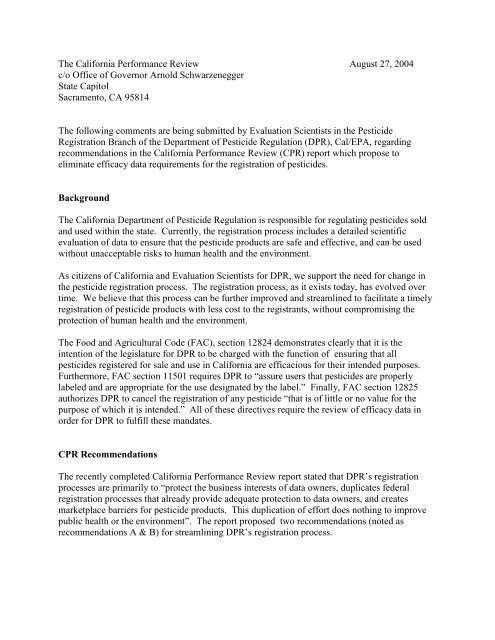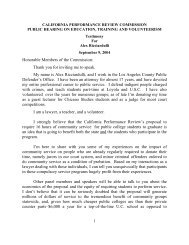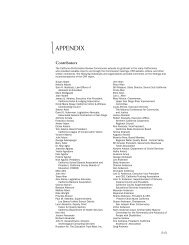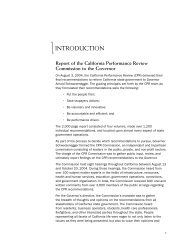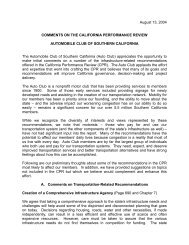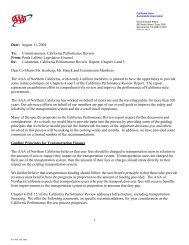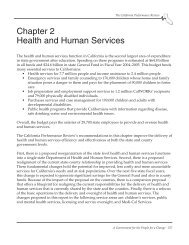The purpose of this letter is to bring your attention to a very serious ...
The purpose of this letter is to bring your attention to a very serious ...
The purpose of this letter is to bring your attention to a very serious ...
Create successful ePaper yourself
Turn your PDF publications into a flip-book with our unique Google optimized e-Paper software.
<strong>The</strong> California Performance Review August 27, 2004<br />
c/o Office <strong>of</strong> Governor Arnold Schwarzenegger<br />
State Capi<strong>to</strong>l<br />
Sacramen<strong>to</strong>, CA 95814<br />
<strong>The</strong> following comments are being submitted by Evaluation Scient<strong>is</strong>ts in the Pesticide<br />
Reg<strong>is</strong>tration Branch <strong>of</strong> the Department <strong>of</strong> Pesticide Regulation (DPR), Cal/EPA, regarding<br />
recommendations in the California Performance Review (CPR) report which propose <strong>to</strong><br />
eliminate efficacy data requirements for the reg<strong>is</strong>tration <strong>of</strong> pesticides.<br />
Background<br />
<strong>The</strong> California Department <strong>of</strong> Pesticide Regulation <strong>is</strong> responsible for regulating pesticides sold<br />
and used within the state. Currently, the reg<strong>is</strong>tration process includes a detailed scientific<br />
evaluation <strong>of</strong> data <strong>to</strong> ensure that the pesticide products are safe and effective, and can be used<br />
without unacceptable r<strong>is</strong>ks <strong>to</strong> human health and the environment.<br />
As citizens <strong>of</strong> California and Evaluation Scient<strong>is</strong>ts for DPR, we support the need for change in<br />
the pesticide reg<strong>is</strong>tration process. <strong>The</strong> reg<strong>is</strong>tration process, as it ex<strong>is</strong>ts <strong>to</strong>day, has evolved over<br />
time. We believe that <strong>th<strong>is</strong></strong> process can be further improved and streamlined <strong>to</strong> facilitate a timely<br />
reg<strong>is</strong>tration <strong>of</strong> pesticide products with less cost <strong>to</strong> the reg<strong>is</strong>trants, without comprom<strong>is</strong>ing the<br />
protection <strong>of</strong> human health and the environment.<br />
<strong>The</strong> Food and Agricultural Code (FAC), section 12824 demonstrates clearly that it <strong>is</strong> the<br />
intention <strong>of</strong> the leg<strong>is</strong>lature for DPR <strong>to</strong> be charged with the function <strong>of</strong> ensuring that all<br />
pesticides reg<strong>is</strong>tered for sale and use in California are efficacious for their intended <strong>purpose</strong>s.<br />
Furthermore, FAC section 11501 requires DPR <strong>to</strong> “assure users that pesticides are properly<br />
labeled and are appropriate for the use designated by the label.” Finally, FAC section 12825<br />
authorizes DPR <strong>to</strong> cancel the reg<strong>is</strong>tration <strong>of</strong> any pesticide “that <strong>is</strong> <strong>of</strong> little or no value for the<br />
<strong>purpose</strong> <strong>of</strong> which it <strong>is</strong> intended.” All <strong>of</strong> these directives require the review <strong>of</strong> efficacy data in<br />
order for DPR <strong>to</strong> fulfill these mandates.<br />
CPR Recommendations<br />
<strong>The</strong> recently completed California Performance Review report stated that DPR’s reg<strong>is</strong>tration<br />
processes are primarily <strong>to</strong> “protect the business interests <strong>of</strong> data owners, duplicates federal<br />
reg<strong>is</strong>tration processes that already provide adequate protection <strong>to</strong> data owners, and creates<br />
marketplace barriers for pesticide products. Th<strong>is</strong> duplication <strong>of</strong> effort does nothing <strong>to</strong> improve<br />
public health or the environment”. <strong>The</strong> report proposed two recommendations (noted as<br />
recommendations A & B) for streamlining DPR’s reg<strong>is</strong>tration process.
CPR Comments<br />
August 27, 2004<br />
Page Two<br />
Recommendation A<br />
Recommendation A proposes <strong>to</strong> eliminate the requirement for <strong>letter</strong>s <strong>of</strong> authorization from the<br />
data owners. Th<strong>is</strong> would allow the use <strong>of</strong> submitted data on file at DPR by all parties who<br />
submit similar products for reg<strong>is</strong>tration.<br />
<strong>The</strong> Evaluation Scient<strong>is</strong>ts <strong>of</strong> DPR fully support Recommendation A in the CPR review. Th<strong>is</strong><br />
proposal would eliminate the requirement for <strong>letter</strong>s <strong>of</strong> authorization in order <strong>to</strong> utilize any data<br />
on file <strong>to</strong> support product reg<strong>is</strong>trations. <strong>The</strong> <strong>letter</strong> <strong>of</strong> authorization allows a pesticide product <strong>to</strong><br />
be reg<strong>is</strong>tered in California based upon data which <strong>is</strong> owned by another company and has been<br />
previously submitted <strong>to</strong> DPR. If the requirement for a <strong>letter</strong> <strong>of</strong> authorization were eliminated,<br />
the subm<strong>is</strong>sion and review <strong>of</strong> most data for products which are similar <strong>to</strong> currently reg<strong>is</strong>tered<br />
products would no longer be required. <strong>The</strong> elimination <strong>of</strong> the need for <strong>letter</strong>s <strong>of</strong> authorization<br />
would d<strong>is</strong>pense with duplicate efficacy data development and review, which would benefit<br />
reg<strong>is</strong>trants and streamline the review process for these products. Similar savings in costs and<br />
review time in addressing most other data requirements would also be realized.<br />
Recommendation B<br />
Recommendation B proposes <strong>to</strong> eliminate the subm<strong>is</strong>sion and review <strong>of</strong> all efficacy data<br />
involving agricultural, industrial, and home and garden use pesticides that are not public healthrelated<br />
products. We feel that <strong>th<strong>is</strong></strong> recommendation should be modified. It appears that <strong>th<strong>is</strong></strong><br />
recommendation <strong>is</strong> derived from the prem<strong>is</strong>e that the U. S. EPA has de-emphasized efficacy data<br />
and does not require their subm<strong>is</strong>sion, and therefore DPR should be cons<strong>is</strong>tent with the federal<br />
requirement.<br />
In the CPR report, however, DPR <strong>is</strong> criticized for duplicating the federal reg<strong>is</strong>tration process<br />
without benefiting public health or the environment. Since the review <strong>of</strong> efficacy data <strong>is</strong> unique<br />
<strong>to</strong> California, <strong>th<strong>is</strong></strong> activity provides direct benefits <strong>to</strong> the public health, the environment, and the<br />
people <strong>of</strong> California which are not forthcoming as a result <strong>of</strong> the U.S. EPA reg<strong>is</strong>tration process.<br />
Some aspects <strong>of</strong> these benefits are termed “consumer protection” in the CPR report, and<br />
d<strong>is</strong>m<strong>is</strong>sed as if <strong>th<strong>is</strong></strong> <strong>is</strong> not a worthy function for DPR. However, consumer protection <strong>is</strong> still a<br />
<strong>very</strong> important benefit <strong>of</strong> the reg<strong>is</strong>tration process, and should not be d<strong>is</strong>carded lightly. <strong>The</strong><br />
original objective <strong>of</strong> the pesticide regula<strong>to</strong>ry program which continues <strong>to</strong>day <strong>is</strong> that products that<br />
do not work should not be sold in the state. Th<strong>is</strong> principle was the bas<strong>is</strong> for founding the<br />
program 100 years ago, and continues <strong>to</strong> benefit the people <strong>of</strong> California <strong>to</strong>day.
CPR Comments<br />
August 27, 2004<br />
Page Three<br />
Resolution<br />
With the implementation <strong>of</strong> Recommendation A, many <strong>of</strong> the objections <strong>to</strong> the requirements for<br />
efficacy data d<strong>is</strong>appear. One set <strong>of</strong> products, those based on old active ingredients, would have<br />
no requirements for data generation or payment for <strong>letter</strong>s <strong>of</strong> authorization, and would also<br />
benefit from reduced review times. In addition, DPR <strong>is</strong> already developing regulations <strong>to</strong><br />
streamline other aspects <strong>of</strong> efficacy data requirements and the review process. We would<br />
support modifications that would allow utilizing our resources <strong>to</strong> focus on the evaluation <strong>of</strong><br />
certain products used in California where efficacy review would be most beneficial. Examples<br />
would be new active ingredients, public health products, and other products with unique uses.<br />
Th<strong>is</strong> would help <strong>bring</strong> products <strong>to</strong> market faster while still retaining the benefits <strong>of</strong> efficacy data<br />
review in those areas where it <strong>is</strong> most productive.<br />
As Evaluation Scient<strong>is</strong>ts with DPR, we w<strong>is</strong>h <strong>to</strong> reiterate our desire <strong>to</strong> be part <strong>of</strong> <strong>your</strong> effort in<br />
streamlining the pesticide reg<strong>is</strong>tration process in California. To that end, we request that you<br />
reconsider <strong>your</strong> recommendation regarding the elimination <strong>of</strong> most efficacy data requirements.<br />
With the implementation <strong>of</strong> Recommendation A, the reg<strong>is</strong>tration process will be greatly<br />
improved, but will still retain the benefits <strong>of</strong> the review <strong>of</strong> efficacy data for certain products<br />
containing new active ingredients or with unique uses. Several <strong>of</strong> these benefits are l<strong>is</strong>ted below.<br />
Efficacy data are necessary <strong>to</strong> establ<strong>is</strong>h the correct use rates for pesticide products. <strong>The</strong><br />
proper rates are important for effective control <strong>of</strong> targeted pests without causing unnecessary<br />
pollution <strong>to</strong> the environment. Determining the correct use rate <strong>is</strong> needed for two main reasons:<br />
1) Using rates higher than necessary means more chemical <strong>is</strong> added <strong>to</strong> the environment than <strong>is</strong><br />
needed <strong>to</strong> do the job, and 2) Ineffective use <strong>of</strong> pesticides, besides failing <strong>to</strong> control the pest,<br />
would lead <strong>to</strong> the development <strong>of</strong> res<strong>is</strong>tance <strong>to</strong> the pesticide in the target pest. Rates that are <strong>to</strong>o<br />
high and excessive applications <strong>to</strong> control res<strong>is</strong>tant pests translate in<strong>to</strong> added costs and more<br />
exposure <strong>to</strong> pesticides for humans and the environment. <strong>The</strong>refore, the evaluation <strong>of</strong> efficacy<br />
data <strong>is</strong> directly linked <strong>to</strong> the health and safety <strong>of</strong> California citizens and the environment.<br />
<strong>The</strong> market won’t police itself. <strong>The</strong> marketplace does not eliminate ineffective products.<br />
Aggressive marketing overcomes the lack <strong>of</strong> efficacy for new products being introduced in<strong>to</strong> the<br />
market. By the time consumers realize that their product <strong>of</strong> choice <strong>is</strong> ineffective, many pounds<br />
<strong>of</strong> pesticide may have been added <strong>to</strong> our environment with no benefit <strong>to</strong> the user. In addition,<br />
any unused portions <strong>of</strong> the ineffective products may become hazardous waste and require special<br />
measures and extra cost for proper d<strong>is</strong>posal. <strong>The</strong> inability <strong>of</strong> the marketplace <strong>to</strong> police the<br />
availability <strong>of</strong> products that do not work <strong>is</strong> clearly demonstrated by the continued sale <strong>of</strong><br />
products across the United States which California has found <strong>to</strong> be non-efficacious. Confirming<br />
the efficacy <strong>of</strong> pesticides, a function which <strong>is</strong> not conducted at the federal level, <strong>is</strong> a unique<br />
benefit <strong>of</strong> the pesticide reg<strong>is</strong>tration process in California.
CPR Comments<br />
August 27, 2004<br />
Page Four<br />
Elimination <strong>of</strong> efficacy data review does not save money. <strong>The</strong> importance <strong>of</strong> consumer<br />
protection for pesticides cannot be overemphasized. <strong>The</strong> CPR report has identified <strong>th<strong>is</strong></strong><br />
responsibility as a negative point. Millions <strong>of</strong> dollars are spent annually in California on<br />
pesticides. If efficacy data review <strong>is</strong> eliminated, it will cost the people <strong>of</strong> California more <strong>to</strong> deal<br />
with increased environmental pollution and pest res<strong>is</strong>tance problems from the overuse <strong>of</strong><br />
ineffective products.<br />
Unique environmental conditions in California. <strong>The</strong> review <strong>of</strong> efficacy data generated under<br />
California conditions <strong>is</strong> essential <strong>to</strong> assessing the performance <strong>of</strong> pesticides in California.<br />
California has unique environmental conditions that vary even within its own regions. <strong>The</strong>se<br />
unique environmental conditions cannot be accounted for by federal data requirements alone. It<br />
<strong>is</strong> <strong>th<strong>is</strong></strong> uniqueness that contributes <strong>to</strong> its diversity and production <strong>of</strong> a wide range <strong>of</strong> agricultural<br />
commodities. Clearly, the determination <strong>of</strong> pesticide efficacy <strong>is</strong> a corners<strong>to</strong>ne <strong>to</strong> protecting the<br />
public health, agriculture, and the environment in California.<br />
California Environmental Quality Act. After rev<strong>is</strong>ing its regulations and expanding the<br />
review <strong>of</strong> scientific data in 1979, the California pesticide regula<strong>to</strong>ry program was certified <strong>to</strong> be<br />
functionally equivalent <strong>to</strong> an Environmental Impact Report (EIR), thus sat<strong>is</strong>fying a requirement<br />
<strong>of</strong> the California Environmental Quality Act (CEQA). <strong>The</strong> certified program included<br />
prov<strong>is</strong>ions for the review <strong>of</strong> efficacy data. Elimination <strong>of</strong> the efficacy data review for pesticide<br />
reg<strong>is</strong>tration could potentially invalidate the CEQA certification as a functionally equivalent<br />
program.<br />
Thank you in advance for considering our comments.<br />
Sincerely,<br />
<strong>The</strong> Evaluation Scient<strong>is</strong>ts Group<br />
Department <strong>of</strong> Pesticide Regulation<br />
445-4400<br />
Jon Alspach Jamshid Ghazanfari Guang Ma Arun Sen<br />
John Armstrong David Haskell Najme Minhaj Jon Shelgren<br />
Rich Bireley John Hea<strong>to</strong>n Amir Omer Jonathan Sullivan<br />
Myra Cheng Don Koehler Mike Papathak<strong>is</strong> Sergi Usachenko<br />
Hanna Daoud Tom Leffingwell Sue Peoples Joe Vandepeute<br />
Steve F<strong>is</strong>her Jesus Leyva <strong>The</strong>resa Rat<strong>to</strong> Jim Yamauchi<br />
cc: Terry Tamminen, Secretary Cal/EPA


